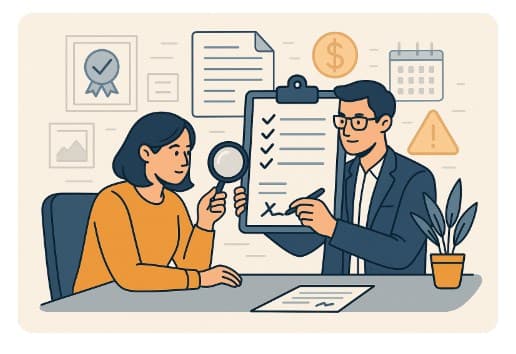Earning links from other sites tells search engines your content is worth noticing. Doing it right consumes significant effort. It’s a process built on research, persistent communication, and finding the right opportunities.
For many businesses, handing this off to experts is the logical step.
The problem is, choosing the wrong agency can set you back months and waste a significant budget. The market is full of providers making big promises. The challenge is finding a partner who provides substance, not just a spreadsheet of URLs.
Securing links from other websites is a fundamental part of establishing authority online. Making it work demands a major investment of time and skill. It requires ongoing outreach, negotiation, and a sharp eye for what makes a link truly beneficial.
A dedicated, performance-driven provider like Linkbuilding.services steps in here. They handle the complex task of acquiring guest posts and relevant links. This allows you to concentrate on your core operations while they work on positioning your brand within relevant online conversations.
Here’s what to focus on during your selection process.

Checking Their Background: Experience That Matters
Before you talk strategy or pricing, you need to know if the agency can deliver. Anyone can say they build great links. Your job is to look for evidence.
Start by asking for specific case studies.
A good case study doesn’t just show a graph going up. It explains the situation before they started, the specific actions they took, and the results achieved. Look for details like the increase in organic traffic for specific keywords or growth in domain authority over a realistic timeframe.
Don’t just glance at the logos in their portfolio. Dig deeper.
If they claim to have worked with a company in your industry, see if you can find those links using a tool like Ahrefs or Semrush. This verification step tells you more than any sales pitch.
The question of niche experience is crucial.
An agency skilled at earning links for finance brands may stumble with a lifestyle blog. Their content angles and publisher connections are likely tailored to a specific world.
Pose this question directly: “Show me work you’ve completed for businesses in my field.” Their response will immediately reveal their familiarity with your market. A partner who understands your audience and competitive landscape will build links that actually contribute to your goals.
Looking Under the Hood: Their Link Building Process
A transparent agency will explain their workflow clearly.
Do they concentrate on creating content that naturally attracts links, or are their efforts centered on proactive outreach? The strongest campaigns usually incorporate a bit of both. Confirm their practices follow ethical guidelines. Avoid any provider that discusses private blog networks or paid links on low-quality directories.
The caliber of the sites they target is fundamental.
The quality of the websites where they place links is non-negotiable.
You need to know they prioritize relevance and context. A link from a highly authoritative site in a completely unrelated field holds little value. Ask them how they vet potential linking sites. Their answer should include checking for organic traffic, editorial standards, and, most importantly, whether the site’s audience aligns with yours. This careful selection is what separates effective link building services from a simple numbers game.
The Partnership Dynamic – Communication and Transparency
The way an agency talks to you is as critical as the links they acquire.
You are forming a partnership. This requires open communication from day one. Agree on update frequency and report content before any contracts are signed.
A monthly report should be more than a spreadsheet of URLs.
A good report provides context. It should show where the link was placed, the topic of the host content, and relevant site metrics. This detail indicates a thorough approach and lets you assess each link’s worth. Be cautious of agencies that are unclear about their reporting standards.
A solid partnership thrives on a two-way conversation.
The agency should view you as a collaborator. Are they open to your suggestions on target websites or anchor text? Do they welcome your input on content topics? An agency that doesn’t seek your input about your own business will probably develop a campaign that feels disconnected.
The most impactful outcomes emerge when your industry insight and their outreach proficiency combine.
The Practicalities – Pricing, Contracts, and Expectations
Let’s talk about money and agreements.
Pricing in link building can be confusing. Pricing models vary. You might see per-link fees, monthly retainers, or custom project quotes. The price tag should make sense for the work being done.
Be skeptical of prices that seem abnormally low.
Acquiring worthwhile links requires specific skills, dedicated time, and access to professional tools. A rock-bottom price often indicates compromised quality. This might mean poorly written content, links on irrelevant sites, or risky tactics. Look beyond the price tag to what’s included. Does the fee cover outreach, content, and analysis, or just the final link?
Your contract is your primary protection.
Before you sign, read it carefully. It should clearly outline the deliverables—the number of links, the reporting schedule, and the term of the agreement. Look for clauses about what happens if a link is removed shortly after placement.
A solid agency will have a straightforward plan for links that get removed down the line. Getting this agreed upon early prevents future issues and shows they stand by their work.
Warning Signs: When to Look Elsewhere
Be deeply suspicious of promises for dozens of links overnight.
Cultivating real publisher relationships is a slow process. Proposals for instant, mass links typically result in useless or damaging placements.
Persistent vagueness is another major concern.
If a company avoids explaining how they work or can’t provide clear examples, take it as a clear warning. Straight talk is essential for a good partnership. If an explanation feels more like a script filled with buzzwords than a genuine conversation, pay attention to that feeling. A credible agency is transparent about its operations.
Watch out for consistent evasiveness.
If an agency is unclear about their methods, hesitant to show past work, or deflects direct questions, it’s best to move on. Openness is critical for a successful collaboration.
If discussions are filled with jargon instead of plain answers, trust your gut. A credible agency operates with transparency.

Final Thoughts
Hiring a link building agency is a serious decision. Rushing it can lead to wasted resources. Your most valuable action is taking the time to research thoroughly.
Think of it like filling a key position on your team. Look for a group whose abilities complement yours, who communicate clearly, and whose principles match your own. The right fit becomes part of your long-term growth, helping build a trustworthy profile that lasts. The work you do now makes that outcome possible.